Home Tags Posts tagged with "francois hollande"
francois hollande
France’s President Francois Hollande has outlined a series of budget measures, including cuts, aimed at achieving economic recovery within two years.
“I have to set the course and the pace” to combat “high joblessness, falling competitiveness and serious deficits“, he said in a televised interview at TF1.
“My mission is a recovery plan and the time frame is two years,” the president added.

Francois Hollande has outlined a series of budget measures, including cuts, aimed at achieving France’s economic recovery within two years
Critics have accused the Socialist president of procrastination since his election in May.
During the interview, Francois Hollande outlined a series of measures, including spending cuts and extra taxes totalling 30 billion euros.
“We will not spend a euro more in 2013 than in 2012,” he said.
Francois Hollande also said that a planned 75% upper tax rate to be imposed on annual income above 1 million euros ($1.28 million) could be dropped after two years.
However, polls have shown that the public is losing confidence in the government.
[youtube CvjJT97udpw]
Paul McCartney has been given France’s highest award, the Legion of Honour, for services to music.
Sir Paul McCartney was decorated by President Francois Hollande during a ceremony at the Elysee Palace in Paris.
As an officer of the Legion of Honour (Légion d’honneur), Paul McCartney joins such cultural icons as actor Clint Eastwood and singers Barbra Streisand and Liza Minnelli.

Sir Paul McCartney was decorated with France’s Legion of Honour by President Francois Hollande during a ceremony at the Elysee Palace in Paris
In his native Britain, Paul McCartney was knighted by the Queen in 1997 – earning the title Sir.
Sir Paul said afterwards: “It is such an honor to be awarded this.”
He recently performed to a global audience at the opening ceremony of the London 2012 Olympic Games.
The Legion of Honour was created by Napoleon Bonaparte in 1802, and comes in five grades – Knight, Officer, Commander, Grand Officer and Grand Cross.
Paul McCartney, 70, has enjoyed a long and successful music career after rising to fame with The Beatles.
He and bandmate John Lennon penned such hits as Yesterday, Hey Jude and A Hard Day’s Night, before the Beatles split up in 1970. Paul McCartney went on to forge a solo career.
[youtube G25nO43DR5c]
French President Francois Hollande has urged Greece to prove it can pass reforms demanded by international creditors, after talks with PM Antonis Samaras.
Greek PM Antonis Samaras has been appealing for more time to introduce the reforms.
But Francois Hollande said no further decision could be taken until European ministers consider a major report on Greece’s finances, due in September.
Donors including the EU insist Greece has to make major spending cuts.
These are needed if Greece is to secure the next tranche of its bailout.

French President Francois Hollande has urged Greece to prove it can pass reforms demanded by international creditors, after talks with PM Antonis Samaras
The Greek government is under pressure to win concessions from Europe to placate the tired nation and lessen the likelihood of a destabilizing period of social unrest.
Antonis Samaras is seeking an extension of up to two years for the necessary reforms, in order to provide Greece with the growth needed to improve its public finances.
In talks with German Chancellor Angela Merkel earlier this week, he was told that the decision would depend on a report from the so-called troika – the International Monetary Fund (IMF), the European Central Bank (ECB) and the European Commission.
Francois Hollande also said Europe needed to consider the report before it could make any further decisions on Greece.
He said decisions on whether to grant Greece more time should be taken when European finance ministers meet in early October.
“We’ve been facing this question for two and a half years, there’s no time to lose, there are commitments to reaffirm on both sides, decisions to take, and the sooner the better,” he said.
Greece’s continued access to the bailout packages depends on a favorable report from the troika.
Athens is trying to finalize a package of 11.5 billion euros ($14.4 billion) of spending cuts over the next two years.
It is also being asked to put in place economic and structural reforms, including changes to the labor market and a renewed privatization drive.
The measures are needed to qualify for the next 33.5 billion-euro installment of its second 130bn-euro bailout.
Greece needs the funds to make repayments on its debt burden. A default could result in the country leaving the euro.
Greece’s Prime Minister Antonis Samaras is expected to repeat his plea for more time to implement reforms when he meets French President Francois Hollande.
The talks in Paris come a day after Antonis Samaras asked for his country to be given “breathing space” during talks with German Chancellor Angela Merkel.
Angela Merkel said she wanted Athens to remain in the eurozone but expected it to stick to the tough bailout terms.
The French leader is now likely to echo that message, correspondents say.
Angela Merkel and Francois Hollande met on Thursday to discuss Greece and urged Athens to stick with the tough reforms.

Greece’s Prime Minister Antonis Samaras is expected to repeat his plea for more time to implement reforms when he meets French President Francois Hollande
On Greece, the two leaders seem to be on the same page.
In Paris, Antonis Samaras is expected to call for more time to reduce the deficit, given the worse-than-expected recession and months lost this year due to elections, our correspondent says.
He adds that the Greek government is under pressure to win a concession from Europe so as to placate this tired nation and lessen the likelihood of a destabilizing period of social unrest.
After Friday’s talks with Angela Merkel in Berlin, Antonis Samaras said: “Greece will stick to its commitments and fulfill its obligations. In fact, this is already happening.
“We’re not asking for more money,” he said, adding that Greece needed “time to breathe”.
The International Monetary Fund (IMF), the European Central Bank (ECB) and the European Commission – the group of donor bodies known collectively as the “troika” – are examining whether Greece is making sufficient progress towards reforming its public finances.
Greece’s continued access to the bailout packages depends on a favorable report from the trio, and an official report is due to be released next month.
Greece is currently trying to finalize a package of 11.5 billion euros ($14.4 billion) of spending cuts over the next two years.
It is also being asked to put in place economic and structural reforms, including changes to the labor market and a renewed privatization drive.
The measures are needed to qualify for the next 33.5 billion-euro installment of its second 130 billion-euro bailout.
Greece needs the funds to make repayments on its debt burden. A default could result in the country leaving the euro.
Antonis Samaras is seeking an extension of up to two years for the necessary reforms, in order to provide Greece with the growth needed to improve its public finances.
Fashion designer John Galliano, who was convicted last year of making anti-Semitic remarks, has been stripped of France’s prestigious Legion d’Honneur.
The decision was published in a decree signed by French President Francois Hollande and published in the country’s official journal.
John Galliano lost his job as artistic director of fashion house Dior over the comments made in a Paris bar.
British fashion designer blamed his outbursts on addictions to drugs and alcohol.

Fashion designer John Galliano, who was convicted last year of making anti-Semitic remarks, has been stripped of France's prestigious Legion d'Honneur
John Galliano, who had been charged with “public insults based on origin, religious affiliation, race or ethnicity”, was given suspended fines totaling 6,000 euros ($7,500) over the incident.
The fines related to incidents on the evenings of 8 October 2010 and 24 February 2011 at La Perle cafe in the Marais district of the capital.
During the trial, the court heard how, during the February incident, John Galliano harangued museum curator Geraldine Bloch about being Jewish and hurled racist insults at her friend – of South Asian origin – before police came to break up the argument.
In a third incident, the court saw an amateur video of John Galliano, while drunk, declaring a love for Hitler.
Since the conviction, John Galliano has kept a low profile. Media reports suggest he is considering moving to Los Angeles.
The Legion d’Honneur, France’s highest award, is given to those who have served France or the ideals it upholds.
John Galliano took over the creative helm of Dior in 1996 and won British Fashion Designer of the Year on four occasions.
German Chancellor Angela Merkel and French President Francois Hollande are set to hold talks in Berlin on whether to give Greece more time to make the cuts required by its debt bailout.
Angela Merkel and Francois Hollande will also meet Greek Prime Minister Antonis Samaras later this week.
Meeting Antonis Samaras yesterday, eurozone chief Jean-Claude Juncker kept the door open for a change to the bailout terms.
Heavily-indebted Greece is in its fifth year of recession and austerity.
Greece is currently trying to finalize a package of 11.5 billion euros ($14.4 billion) of spending cuts over the next two years.
It is also being asked to put in place economic and structural reforms, including changes to the labor market and a renewed privatization drive.
The measures are needed to qualify for the next 33.5 billion-euro installment of its second 130bn-euro bailout.
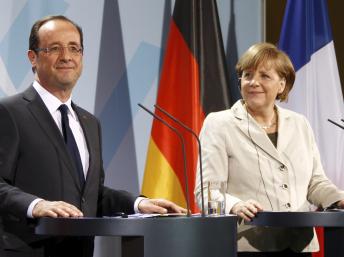
Angela Merkel and Francois Hollande are set to hold talks in Berlin on whether to give Greece more time to make the cuts required by its debt bailout
The “troika” of donor bodies monitoring the bailout – the International Monetary Fund (IMF), the European Central Bank (ECB) and the European Commission – are due in Athens next month to report on whether Greece has made enough progress.
Greece needs the funds to make repayments on its debt burden. A default could result in the country leaving the euro.
Antonis Samaras is seeking an extension of up to two years for the painful steps, in order to provide Greece with the growth needed to improve its public finances.
In an interview published on Wednesday, he told Germany’s biggest daily, Bild, that his country needed “a little breathing space” in order to kick-start growth and reduce its deficit.
After meeting Antonis Samaras on Wednesday, Eurogroup head Jean-Claude Juncker said a decision on an extension would depend on the troika’s report.
“We have to discuss the length of the period and other dimensions,” Jean-Claude Juncker told a news conference, while sitting alongside Antonis Samaras.
He said Greece was facing its “last chance” to make the necessary changes, but praised the “tremendous efforts” it has made so far to cut its deficit. He also stressed he was “totally opposed” to Greece leaving the euro.
Antonis Samaras called the discussions “fruitful”.
At least publicly, many EU leaders remain resolutely opposed to any moves to change the terms of Greece’s bailout.
But Jean-Claude Juncker’s remarks suggest there is room for manoeuvre and that an extension has not been ruled out.
Angel Merkel has said that she and Antonis Samaras will not make any decisions on the issue in their talks on Friday. Antonis Samaras goes on to meet Francois Hollande on Saturday.
On Wednesday, Francois Hollande also discussed Greece with British Prime Minister David Cameron in a telephone call.
“Both welcomed the recent actions of the ECB and agreed that this did not negate the need for Greece to stabilize their own economy and prevent any further detrimental effects to the wider eurozone,” David Cameron’s office said in a statement, without specifying which ECB actions they were referring to.
The talks come amid reports that due to the worsening state of the economy, which affects tax receipts and welfare spending levels, Greece may now need to find savings of up to 13.5 billion euros – 2 billion more than thought.
Greece discussions timetable
• 22 August: Greek PM Antonis Samaras meets Eurogroup chief Jean-Claude Juncker
• 23 August: Angela Merkel and Francois Hollande meet
• 24 August: Chancellor Merkel and PM Samaras meet
• 25 August: President Hollande and PM Samaras meet
• Early September: Troika staff go back to Greece
• 14-15 September: Gathering of European finance ministers in Cyprus
• Troika’s review of progress to be published by the end of September
• 8-9 October: Finance ministers attend two days of meetings in Luxembourg
France’s President Francois Hollande and his partner Valerie Trierweiler are living “separate lives” and could even announce their break-up over summer, GALA Magazine has revealed.
The prediction comes after Valerie Trierweiler, the partner of Francois Hollande, was attacked for sending a Twitter message supporting a rival of Segolene Royale, the mother of his four children, in parliamentary elections last month.
The controversial Twitter message was posted in June, less than a month after Francois Hollande was elected to president, causing a national outcry in France.
Now GALA Magazine has revealed that friends of the presidential couple believe they could now be set to end their seven-year relationship.
The magazine said: “Relations between them have become so tense that there is talk of them splitting up.
“These days they hardly see each other and the President is said to be thinking about leaving his partner, announcing the news over the summer before the government returns to work in the autumn.”
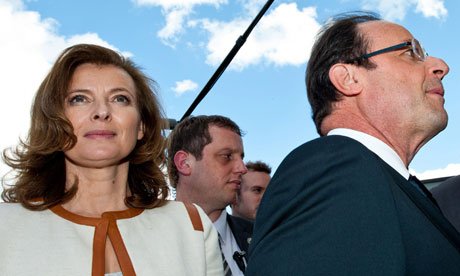
President Francois Hollande and his partner Valerie Trierweiler are living “separate lives” and could even announce their break-up over summer
Francois Hollande was said to be “furious” at his girlfriend’s online antics and Prime Minister Jean-Marc Ayrault broke with protocol and told Valerie Trierweiler she should “know her place”.
Thomas Hollande, the eldest son of President Hollande and Segolene Royale, also scorned Valerie Trierweiler, confirming that he never wanted to see her again after she destroyed president’s “Mr. Normal” image.
Valerie Trierweiler, dubbed the Rottweiler, was initially defiant but apologized for her tweet two weeks after it was sent in June.
One friend of the First Lady told Le Parisien newspaper: “She knows she made a mistake.
“She did not appreciate the consequences that her tweet would have on the authority of the head of state, on the socialist party, on her children and those of Francois Hollande.”
Valerie Trierweiler also told French TV that: “I will count to 10 before tweeting.”
Francois Hollande has already publicly expressed his disapproval of the row between his current and former lovers during a televised Bastille Day address to the nation on July 14.
The President said: “I am for a clear distinction between public and private life.
“I believe private matters should be regulated in private and I have asked those close to me to respect this.”
President Francois Hollande also left the divorced mother-of-three at home in Paris when he travelled to London for meetings with both Prime Minister David Cameron and the Queen earlier this month.
Francois Hollande and Segolene Royal lived together for 28 years before the President left her for Valerie Trierweiler in 2005.
News magazine L’Express wrote of Valerie Trierweiler last month: “For her, Segolene Royal remains the object of profound and irrational jealousy that complicates political relations.
“It is almost impossible to even speak about the woman in front of her, even from a purely political angle.
“It’s stronger than she is.”
Newly elected French President Francois Hollande celebrated his first-ever National Day (known outside of France as Bastille Day) as head of state on Saturday with usual pomp, military parade and flight show.
At 10:00 a.m. local time, Francois Hollande presided the military parade down the Champs Elysees Avenue, which involved some 4,950 soldiers, 368 armored vehicles, 241 horses and 98 jets and helicopters.
French Prime Minister Jean-Marc Ayrault hailed a “national unity,” adding that the Bastille Day represented “an opportunity for the French to come together around the values of France.”
The president’s girlfriend Valerie Trierweiler, who had been keeping a low profile after tweeting her support for a rival of Francois Hollande’s ex-companion Segolene Royal in legislative elections last month, made her first public appearance on Saturday.
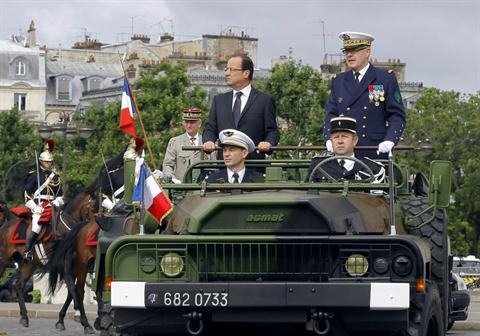
French President Francois Hollande celebrated his first-ever National Day
The two-hour parade was closed by a paratroop air show near the Concorde Square. After the parade, Francois Hollande was scheduled to join injured soldiers in Afghanistan to lunch.
Francois Hollande promised to withdraw French combat troops from Afghanistan by the end of this year, two years ahead of the alliance’s plan.
However, the president said France would continue to support Afghanistan in civilian fields including health, education, culture and agriculture and also assist its defense and interior ministries in training.
“This July 14th is the last one of our combat units in Kapisa to pass in Afghanistan. Two thousand soldiers will return to their homes at the end of the year,” the president said when addressing a group of ministers and military figures on the eve of the National Day.
“It is an act of sovereignty that France has posed freely. I took this decision, in harmony with our allies, and with the agreement of the Afghan authorities,” he noted.
Francois Hollande also unveiled a new white paper on defense and national security, the fourth document of its kind for the country, which aims to “define our defense strategy and capabilities of our forces for the next 15 years,” he said.
“The objective is to ensure the long term performance, efficiency and balance of our forces,” he stressed.
In a televised interview later in the afternoon, the head of state will review his first two months of presidency, which has been overshadowed by eurozone crisis and jumping unemployment rate following a wave of job cuts in the country’s leading companies.
Wet summer weather is unlikely to dampen the enthusiasm of Parisians and visitors who turned out in large numbers to witness the annual celebration.
Gardens of the Elysee Palace will be open to visitors throughout the afternoon. Huge crowds are expected to enjoy fireworks display centered on the Eiffel Tower and across the country.
Bastille Day marks July 14, 1789, when French citizens stormed the Bastille prison in Paris, which helped spark the French Revolution.
Thomas Hollande, French president’s eldest son, has publicly attacked the country’s First Lady Valérie Trierweiler, accusing her of destroying the president’s election-winning “normal image”.
Thomas Hollande says he and his brothers and sisters have made it clear they no longer want to see their father’s partner, Valérie Trierweiler, after she helped destroy their mother Ségolène Royal’s political hopes with a jealous tweet.
Valérie Trierweiler, 47, used Twitter to express her support for the rival of François Hollande’s former partner Ségolène Royal days before France’s legislative elections last month.
Ségolène Royal, 58, went on to lose her parliamentary seat and saw her ambition to become the speaker of France’s Assemblée Nationale vanish with it.
In an interview with the news magazine Le Point, Thomas Hollande, 27, who was active behind the scenes in both his parents’ election campaigns, shatters any attempts by the Elysée Palace to paper over the domestic-turned-political spat.
“What I find reproachful about the tweet is that it put the private life into the public domain,” he told Le Point.
“It pained me on behalf of my father who absolutely detests anyone talking about his private life. It destroyed the normal image that he had constructed.”

Thomas Hollande, French president's eldest son, has publicly attacked the country's First Lady Valérie Trierweiler, accusing her of destroying the president's election-winning "normal image
During a long and bitter election campaign against Nicolas Sarkozy, 57, François Hollande, also 57, had presented himself as Monsieur Normal as a direct contrast to his predecessor’s flashy bling-bling image.
Valérie Trierweiler was portrayed as a more discreet and dignified alternative to the former first lady, supermodel-turned-singer Carla Bruni-Sarkozy, 44.
Thomas Hollande said his father was “stupefied” by the tweet, which was reportedly posted after his father and Valérie Trierweiler fell out over the president issuing an official message of support for Royal, who was standing for parliamentary in the coastal constituency of La Rochelle.
Shortly afterwards Valérie Trierweiler sent a message supporting SégolèneRoyal’s rival, Socialist party dissident Olivier Falorni, who went on to secure a convincing victory.
“I knew that she would do something one day, but not such a huge blow. It’s staggering,” said Thomas Hollande, one of the Hollande-Royal couple’s four children.
He said it was “only logical, no?” that he and his siblings no longer wished to have anything to do with Valérie Trierweiler, a journalist with Paris Match magazine, adding: “What matters is that relations with our father return to normal.”
Thomas Hollande, a lawyer, said he had a tête-à-tête dinner with his father who had asked him not to “add fuel to the fire” over the tweet, which caused a national scandal.
Le Point said the president was likely to refer to the tweet during the traditional 14 July Bastille Day speech, in which he is expected to clarify Valérie Trierwieler’s role.
The president’s son, however, had clearly ignored his father’s advice not to rake over the ashes of the row. Speaking of Valérie Trierweiler, he told Le Point the current situation was causing instability.
“Either she’s a journalist, or she has an office at the Elysée … and, above all, no more tweets,” he said.
He also said his mother had not abandoned her political ambitions, suggesting she could take up a government post.
“A minister? Why not, in a few months? In politics, one is never dead.”
Never far from Hollande’s side during the long election campaign, Valérie Trierweiler’s absence has been conspicuous since the offending tweet. On Monday François Hollande travelled to London to meet David Cameron and the Queen without his partner.
French commentators also pointed out that she had not accompanied the French leader to the G20 summit in Mexico. She is expected to be at François Hollande’s side during the official Bastille Day parade on Saturday on the Champs Elysées.
France’s President Francois Hollande has said he plans a new law to punish denial that the 1915-1916 killing of Armenians was genocide.
A previous law approved by the French parliament was struck down in February by the Constitutional Council, which said it infringed freedom of speech.
Turkey rejects the term “genocide” for the deaths of Armenians during their deportation by the Ottoman Empire.
The issue has strained Franco-Turkish relations in recent years.
Francois Hollande’s predecessor Nicolas Sarkozy had also ordered his government to draft a new law after the old one was struck down.
“Francois Hollande has again expressed his willingness to propose a bill designed to curb the denial of the Armenian genocide, as he had said during his campaign and even before,” the Coordinating Council of Armenian Organisations of France (CCAF) told the AFP news agency.
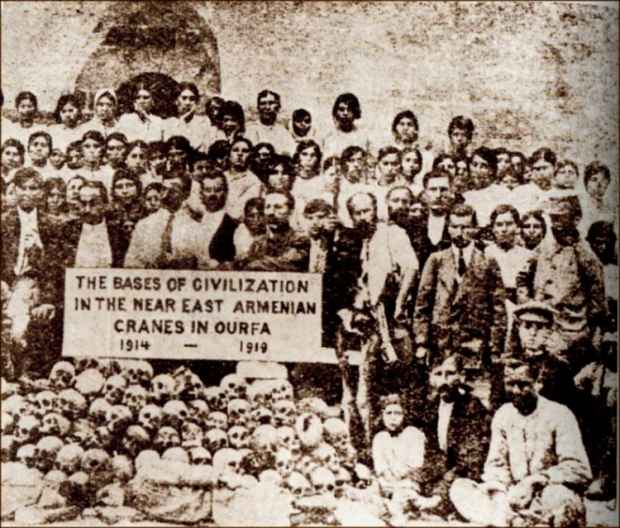
Francois Hollande has said he plans a new law to punish denial that the 1915-1916 killing of Armenians was genocide
A delegation from the CCAF will meet Francois Hollande before the end of the month to discuss what form the new law would take, French media reports say.
On Thursday, remarks by French Foreign Minister Laurent Fabius during a meeting with his Turkish counterpart appeared to indicate that the Constitutional Council’s ruling would make it impossible to take up the issue again.
However, Francois Hollande’s office said on Saturday: “The president expressed his commitments during the campaign. He will keep them.
“We must find a path, a road that allows for a text that is consistent with the constitution.”
The vote on the previous bill in January spurred angry protests in both in Paris and Ankara. The Turkish government suspended political and military co-operation with France.
The Turkish government argues that judging what happened in eastern Turkey in 1915-1916 should be left to historians, and that the new French law would have restricted freedom of speech.
Armenia says up to 1.5 million people died in 1915-1916 as the Ottoman empire split. Turkey has said the number of deaths was much smaller.
The killings are regarded as the seminal event of modern Armenian history, a tragic bond uniting one of the world’s most dispersed peoples.
Among the other states which formally recognize them as genocide are Argentina, Belgium, Canada, France, Italy, Russia and Uruguay. The UK, US, Israel and others use different terminology.
France is home to an estimated 500,000 ethnic Armenians while about 550,000 Turkish citizens also live in the country.
Competing laws:
• Both the Holocaust and killing of the Armenians are recognized as acts of genocide in France
• Denial of the Holocaust is punishable under the 1990 Gayssot law, which is based on the findings of the Nuremberg Tribunal
• Some legal experts argue that unless the Armenian killings are formally recognized as an act of genocide by an international commission their denial cannot be made punishable
• In the absence of international certification, some legal experts argue the term “Armenian genocide” may be challenged on grounds of freedom of speech
• French MPs argued they had sufficient authority to legislate both on acts of genocide and their denial
EU leaders at Brussels summit have agreed to use the eurozone’s bailout fund to support struggling banks directly, without adding to government debt.
Speaking after 13 hours of talks in Brussels’, EU chief Herman van Rompuy also said a eurozone-wide supervisory body for banks would be created.
Officials said the plans could be finalized during July.
Analysts say Germany appears to have given ground after pressure from Spain and Italy to provide more support.
The two southern European countries had withheld support from an earlier plan to for a growth package worth 120 billion Euros ($149 billion).
They wanted measures to lower their borrowing costs.
Herman van Rompuy said the new proposals would break the “vicious circle” between banks and national governments.
Although Germany appears to have compromised, Chancellor Angela Merkel has managed to ensure that Brussels has more control over the finances of eurozone countries, something she had wanted.
The deal came about after new French President Francois Hollande appeared to throw his weight behind Italy and Spain.
“I’m here to try to find rapid solutions for those countries facing pressure from the market, despite having made huge efforts to balance their budgets,” the socialist French president said.
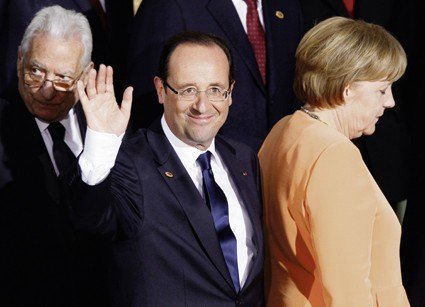
EU leaders at Brussels summit have agreed to use the eurozone's bailout fund to support struggling banks directly, without adding to government debt
The new growth package, announced by Herman van Rompuy, is made up of:
• A 10 billion-euro boost of capital for the European Investment Bank, expected to raise overall lending capacity by 60 billion Euros
• Targeting 60 billion Euros of unused structural funds to help small enterprises and create youth employment
• A pilot launch of EU project bonds worth 4.5 billion Euros for infrastructure improvements, focusing on energy, transport and broadband.
In Brussels, both Italy and Spain were pushing the eurozone bloc to agree steps to reduce the interest rates the two countries have to pay.
Spanish 10-year government bonds were trading at yields above 6.9% on Thursday, coming close to the 7% considered unaffordable.
Spain’s Prime Minister Mariano Rajoy said debt sustainability was a pressing problem.
“We are paying rates that are too high to finance ourselves and there are many Spanish public institutions that cannot finance themselves.”
Spanish and Italian leaders are worried that their countries could soon – in effect – be shut out of international markets and forced to seek assistance.
Angela Merkel has warned there is no “magic formula” to solve the crisis.
Several EU leaders want individual countries’ debts guaranteed by the whole eurozone, for instance in the form of centrally issued eurobonds.
But Angela Merkel told the German parliament on Wednesday that eurobonds were “the wrong way” and “counter-productive”, adding: “We are working to breach the vicious circle of piling up debt and breaking [EU] rules.”
She said to loud applause: “Joint liability can only happen when sufficient controls are in place.”
Stronger competitiveness was the condition for sustained growth, the chancellor said.
Meanwhile, UK Prime Minister David Cameron said on his arrival at the summit that eurozone countries had some “hard decisions” to make.
When asked about plans for transferring more budgetary powers to the EU level, he said he shared “people’s concerns about Brussels getting too much power”.
European authorities have also unveiled proposals such as the creation of a European treasury, which would have powers over national budgets. The 10-year plan is designed to strengthen the eurozone and prevent future crises, but critics say it will not address current debt problems
EU leaders at Brussels summit are examining how to ease the eurozone debt crisis amid competing visions about how to revive the worst-hit economies.
As the Brussels summit opened, French President Francois Hollande made a new plea for EU solidarity and Spain warned that its borrowing costs were too high.
German Chancellor Angela Merkel scorned talk of pooling eurozone debt, saying it would require more budget rigor.
But there appears to be broad agreement on new measures to stimulate growth.
On arrival at the summit, UK Prime Minister David Cameron said “these are hard decisions for the eurozone countries to make and we should be encouraging them to go ahead”.
But when asked about plans for transferring more budgetary powers to the EU level David Cameron said: “I… in many ways share people’s concerns about Brussels getting too much power.”
European authorities have unveiled proposals such as the creation of a European treasury, which would have powers over national budgets.
The 10-year plan is designed to strengthen the eurozone and prevent future crises, but critics say it will not address current debt problems.
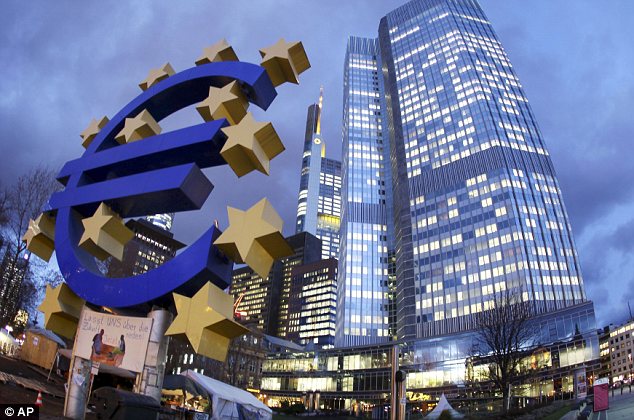
EU leaders at Brussels summit are examining how to ease the eurozone debt crisis amid competing visions about how to revive the worst-hit economies
Spanish 10-year government bonds were trading at yields above 6.9% on Thursday morning, coming close to the 7% considered unaffordable.
Spain’s Prime Minister Mariano Rajoy said debt sustainability was a pressing problem.
“We are paying rates that are too high to finance ourselves and there are many Spanish public institutions that cannot finance themselves.”
Spanish and Italian leaders are worried that their countries could soon – in effect – be shut out of international markets and forced to seek assistance.
The debate about short-term fixes could become very bitter indeed.
Angela Merkel has warned there is no “magic formula” to solve the crisis.
Several EU leaders want individual countries’ debts guaranteed by the whole eurozone, for instance in the form of centrally issued eurobonds.
But Angela Merkel told the German parliament on Wednesday that eurobonds were “the wrong way” and “counter-productive”, adding: “We are working to breach the vicious circle of piling up debt and breaking [EU] rules.”
She said to loud applause: “Joint liability can only happen when sufficient controls are in place.”
Stronger competitiveness was the condition for sustained growth, the chancellor said.
Francois Hollande believes eurobonds should be a eurozone priority for helping countries like Italy and Spain bring their borrowing costs down.
But Angela Merkel continues to insist that before anything is done to increase the burden on German taxpayers, building blocks towards greater fiscal, banking and, eventually, political union must be put in place.
There is certainly a chance that the summit will take a small step on a path that would partly deal with the fundamental weaknesses in the eurozone.
But in the absence of major short-term action, he explains, borrowing costs for countries such as Spain and Italy are likely to remain painfully high, making the eurozone’s financial situation strained for a long time to come.
Angela Merkel said progress had been made on a pact for growth and she hoped European leaders would adopt a 130 billion-euro ($162 billion) stimulus package.
Francois Hollande, who was elected French president on an anti-austerity ticket, said on Thursday there were “points in common on growth”.
“Merkel has moved in the direction I wanted,” he told French TV channel France 2.
Adding that he and the German leader had also agreed on the financial transaction tax, he said they still needed to find agreement “on stability”.
“There are ongoing discussions, it’s normal,” he said.
“We need to act in support of the countries which need it: Spain and Italy.”
President Francois Hollande’s Socialist Party has won enough seats in French parliament to form an absolute majority, according to exit polls obtained by the AFP news agency.
The exit polls suggested Socialist Party and its allies would take more than 312 out of 577 seats in the National Assembly.
If confirmed, it means the Socialists will not have to rely on support from either the Greens or the far-left.
It gives the president strong backing as he seeks measures to boost growth.

President Francois Hollande’s Socialist Party has won enough seats in French parliament to form an absolute majority, according to exit polls
Francois Hollande has promised to hire more public workers and to refocus EU fiscal efforts away from their emphasis on austerity.
The vote was the second round of a two-part parliamentary election.
The polls suggested the conservative UMP party and its allies would win between 212 and 234 seats, and the far-right National Front between one and four seats.
France is voting in a second round of parliamentary elections seen as crucial for President Francois Hollande’s reform agenda.
Socialist Francois Hollande, who was elected last month, is seeking a solid left-wing majority in the lower house.
He has promised to hire more public workers and to refocus EU fiscal efforts from austerity to “growth”.
Socialists and their left-wing allies won 46% in last Sunday’s first round, against 34% for the centre-right UMP.
Nationwide, the turnout was a modest 57%. France’s 46 million eligible voters are picking representatives for 577 seats in the National Assembly.
After the first round, 36 seats out of 577 were declared in constituencies where the winner got more than 50% of the vote. Socialists and their allies won 25 of those seats.
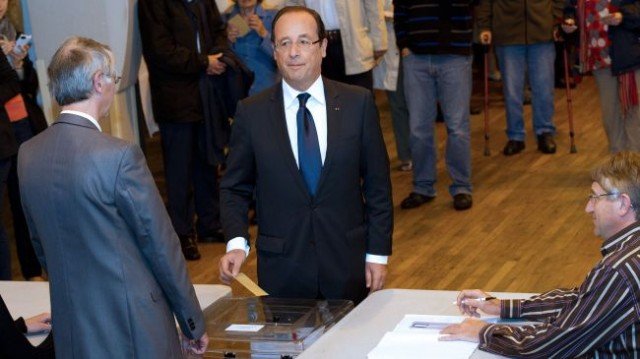
France is voting in a second round of parliamentary elections seen as crucial for President Francois Hollande's reform agenda
The French Senate is already under the control of the Socialists and their allies following elections in 2011.
The Socialist Party has concluded electoral pacts with the smaller Europe Ecology/The Greens (EELV) as well as the Radical Left party – with marginal candidates withdrawing from the second round in order not to split the left-wing vote in individual constituencies.
The vote is also seen as a key test for the anti-immigration National Front (FN), which took 13.6% in the first round.
The FN – which has no nationally elected representative – is hoping to take a number of seats, notably for its leader Marine Le Pen in the northern town of Henin Beaumont.
Another closely watched race will be in La Rochelle in the west. Official Socialist candidate Segolene Royal – who is also Francois Hollande’s former partner – is standing against a dissident left-winger, Olivier Falorni, who defied the national leadership and maintained his candidacy.
In a well-publicized twist in the past week, Francois Hollande’s current partner, Valerie Trierweiler, expressed her support for Olivier Falorni in a tweet.
On the right, the UMP of former President Nicolas Sarkozy has concluded an electoral agreement with its centrist Radical Party and New Centre allies.
The start of Francois Hollande’s term has been dominated by the eurozone crisis. In his month since taking office, he has taken part in a series of summits urging his EU partners to engage in stimulus spending and to consider eurobonds.
His government is due to present a revised budget plan to parliament next month.
French exit polls suggest that Francois Hollande’s Socialists and their allies are set for a majority following the first round of legislative elections.
The Socialists appear tied with the right-wing UMP party on about 35% of the vote, but the support of Green allies gives them closer to 40%.
The outcome of the polls is expected to determine the extent and pace of reform under the newly-elected French leader.
Run-offs are to be held a week later.
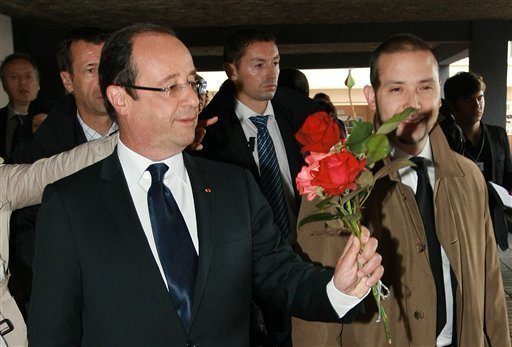
French exit polls suggest that Francois Hollande's Socialists and their allies are set for a majority following the first round of legislative elections
The early indications are that turnout has been much lower than in the presidential elections in April, at about 60%.
France’s 46 million eligible voters are picking representatives for 577 seats in the National Assembly.
TNS Sofres, Ipsos and OpinonWay pollsters all agreed that the political left, including the Communist-backed Left Front, would win at least 289 seats in the 577-seat Assembly and possibly as many as 368 seats.
These are predictions rather than hard results and it is hard to predict accurately what the final tallies will be before next week’s decisive round of voting.
But with the Senate already under the control of the Socialists, it appears that Francois Hollande will have a majority in the lower house – even if only with the support of allies – which would give him unprecedented power to force through his reform programme.
Francois Hollande’s government is due to present a revised budget plan to parliament next month.
The result of the parliamentary election will determine the pace of reform and how radical it becomes.
“It’s a good result tonight… but we have to remain mobilized for the second round,” Foreign Minister Laurent Fabius, an influential Socialist, was quoted by news agency AP as saying.
The election also saw a surge in support for Marine Le Pen’s far right National Front, which won almost 14% of votes, according to the exit polls – well above the 4% it got in the 2007 parliamentary elections.
[youtube KWSM1s18Osg]
France is voting in parliamentary elections expected to determine the extent and pace of reform under new President Francois Hollande.
Voting for the lower house is beginning with a first round, followed by run-offs a week later.
Correspondents say if Francois Hollande’s Socialist Party can win a majority, he will have the mandate to push through bold tax and spend policies.
There is also a closely watched battle between the far right and the far left.
The far-right National Front is hoping to follow up a strong performance in the recent presidential election by gaining its first presence in the 577-seat National Assembly since the 1980s.
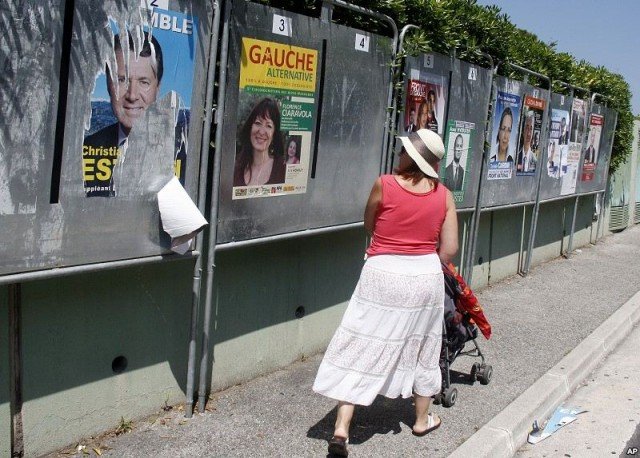
France is voting in parliamentary elections expected to determine the extent and pace of reform under new President Francois Hollande
With the senate already under the control of the Socialists, a majority in the lower house would give Francois Hollande unprecedented power to force through his reform programme.
Francois Hollande’s government is due to present a revised budget plan to parliament next month.
The result of the parliamentary election will determine the pace of reform and how radical it becomes.
If the left fails to win, France would enter into a period of “cohabitation”, in which the presidency and the lower house are controlled by political rivals.
The right-wing Union for a Popular Movement (UMP) – the party of former President Nicolas Sarkozy – is defending an absolute majority in the current National Assembly.
The party has concluded an electoral agreement with its centrist Radical Party and New Centre allies.
With the parliamentary polls coming hot on the heels of April’s presidential election, there have been concerns over voter turnout.
Speaking on Thursday, Francois Hollande said: “I call on the French to vote. I call on them to give a large majority, a solid and coherent one.”
One of the main stories of the presidential election was the third place finish of the National Front’s Marine Le Pen.
The far right’s strongest chances of success in this poll are in a string of constituencies in the north and southeast.
The key battle is in the northern industrial town of Henin Beaumont where Marine Le Pen faces the flamboyant leader of the far left, Jean Luc Melenchon.
[youtube J2N3lbJHQyI]
A picture of France’s First Lady Valerie Trierweiler taken on the beach when she was just 16 year-old reveals the natural elegance that has captivated new French President Francois Hollande.
Dressed in only a swimming costume with a silver chain around her neck and a hand in her chestnut brown hair, Valerie Trierweiler was renowned for her good looks and her ambition even as a school-girl.
Old friends remember Valerie Trierweiler, born Massonneau, as a girl used to turning heads but disinterested in the attention her looks brought her.
Instead she relished being independent and was one of only a few girls at school to own a moped which she enjoyed using to get around.
Valerie Trierweiler appeared to have set her sights firmly on rising from her humble origins and putting her difficult childhood behind her.
Raised in the town of Angers in the Loire Valley, she was brought up in a council house.
Valerie’s father, a clerk, had lost a leg after standing on a Second World War landmine in 1944 when he was 12.
His disability combined with being one of six children meant Valerie Trierweiler’s childhood was not easy and she appears to have adopted a steely manner which has been criticized.

A picture of Valerie Trierweiler taken on the beach when she was just 16 reveals the natural elegance that has captivated French President Francois Hollande
However old school friends defended the twice-divorced mother-of-three who is the First Lady in the Elysee Palace to be unmarried and have a job – she is a political journalist for Paris Match.
An old classmate from Joachim du Bellay High School recalled: “She was always very attractive and very pleasant with it.
“She had a lot of ambition. She knew where she wanted to go in life. She was one of the few girls at school to own a moped!
“Life was not easy at home, being one of six children but she never complained. She does not have a bad part to her character, she just has a lot of character!
“She has been described as cold but that is not the case she is simply reserved, protective. You could tell she had a promising future,” said Florence Pellé, Valerie Trierweler’s best friend at school.
“And she turned all of the boys’ heads as well! But she wasn’t really interested in the good-looking boys. She was looking for something else, someone more intellectual, deep.
“She always had a lot of charm. And notoriety has not changed her, she has remained the same, straight-forward.”
Old friend Loick Berrou added: “Valerie was fresh and full of life. Her beauty and charm shone through.”
Another old friend added: “She loved being outside. She would ride her bike, swim in the river and help out at a local farm.
“And she also did synchronized swimming!”
Residents in Angers are proud of Valerie Trierweiler’s elevation to the Elyse Palace.
Her face is displayed on the front cover of many of France’s magazines and proudly displayed in news agents across the town.
Her uncle Florent Massonneau said yesterday: “I am proud that that Valerie has become the first lady.
“As a young woman she had it all – beauty and intelligence.”
Florent Massonneau added: “Valerie did not have an easy childhood. Her father loved her very much but he was disabled. He lost a leg in the war.
“And he died young, too young. She was not even 21.”
Florent Massonneau lives around the corner from the council house that was Valerie Trierweiler’s childhood home, in the working class district of Monplaisir.
Her mother Jeanne still lives there.
Valerie’s mother, who worked as a cashier at the local ice-rink to make ends meet after her husband died, continues to play an important role in her daughter’s life.
Valerie Trierweiler has three sons, aged 15, 17 and 19 from her marriage to her second husband Denis Trierweiler, a sub-editor at glossy French magazine Paris Match.
G8 leaders of the world’s most powerful economies say they want debt-stricken Greece to remain in the eurozone.
In their summit communique, G8 leaders also committed themselves to promoting growth alongside fiscal responsibility.
However, the leaders acknowledged “the right measures are not the same for each of us”.
Greece’s possible exit from the eurozone was high on the agenda, following inconclusive elections there.
The leaders of France, Germany, the US, the UK, Italy, Japan, Canada and Russia have been meeting at Camp David in the US state of Maryland.
“We agree on the importance of a strong and cohesive eurozone for global stability and recovery, and we affirm our interest in Greece remaining in the eurozone while respecting its commitments,” the statement said.
The global economic recovery was showing signs of progress, they said, but “significant headwinds persist”.
G8 leaders are divided on whether to continue with austerity or back stimulus measures instead.
German Chancellor Angela Merkel favors austerity, while newly elected French President Francois Hollande wants to pursue policies for greater growth, as does President Barack Obama.
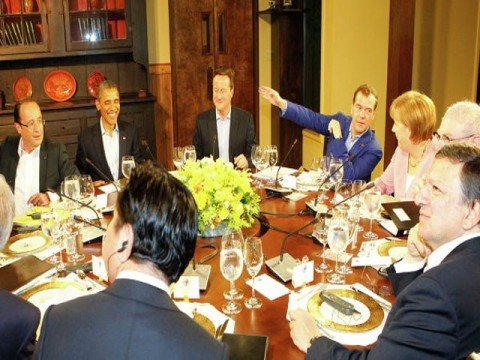
G8 leaders of the world's most powerful economies say they want debt-stricken Greece to remain in the eurozone
There are caveats but the first line of the communique – about promoting growth and jobs – means Presidents Obama and Hollande have won the day.
However, it is not clear that Angela Merkel has got their message and is prepared to act on it, our correspondent adds.
US officials said Angela Merkel would hold a one-on-one meeting with Barack Obama later on Saturday.
Italian Prime Minister Mario Monti said there would be another key meeting in June in Rome, where he would host Francois Hollande and Angela Merkel.
Earlier, UK Prime Minister David Cameron called for deficit reduction.
“There is a growing sense of urgency that action needs to be taken, contingency plans need to be put in place and the strengthening of banks, governments, firewalls and all of those things need to take place very fast,” he told reporters at Camp David.
The likelihood of Greece leaving the euro is growing.
The office of the Greek interim prime minister said on Friday that Angela Merkel had suggested the country hold a referendum on euro membership on election day, but the German chancellor’s cabinet dismissed this as “false”.
Greek voters will again go to the polls on 17 June after earlier elections failed to produce a viable coalition to run the country.
A caretaker government was sworn in this week after elections.
Investors fear any refusal by Athens to impose deep spending cuts agreed under a bailout deal could result in the country quitting the bloc of 17 countries that use the euro.
Two opinion polls published on Saturday showed the anti-bailout left-wing Syriza bloc neck and neck with centre-right New Democracy, both on about 25%.
Larger countries such as Spain or Italy struggling to ease their debt loads might then become vulnerable, potentially triggering wider eurozone upheaval and even a global financial crisis to rival the one of 2008.
The G8 summit has now moved on to other issues, including food security, energy and climate, partnerships in North Africa and the Middle East and the war in Afghanistan.
After the G8 summit ends on Saturday evening, most of the leaders will decamp to Chicago to join a larger group of international officials for a NATO summit on Sunday and Monday, at which Afghanistan is expected to be the main item on the agenda.
Three men arrested in Chicago on suspicion of planning to throw petrol bombs at the NATO summit have been charged with conspiracy to commit terrorism and possession of an explosive or incendiary device.
Prosecutor Anita Alvarez said the campaign headquarters of President Barack Obama and the home of mayor Rahm Emanuel were among the targets.
France’s President Francois Hollande has arrived in Berlin for key talks with German Chancellor Angela Merkel, after his plane was apparently hit by lightning.
Presidential plane was forced to turn back to Paris and Francois Hollande later completed his journey on a second plane.
During his inauguration speech earlier in the day, Socialist Francois Hollande appealed for “a compromise” over the German-led focus on austerity.
He called for an emphasis on “growth”.
Describing the incident with the first plane, Francois Hollande’s spokesman said that the aircraft “could have been hit by lightning”, the AFP news agency reports.
“For security reasons, it turned back,” he said, adding that no-one was hurt.
It is very common for planes to be hit by lightning and most pilots will experience two strikes a year, some many more.
Planes are designed to dispel the electricity out through the wingtips, so that it is rare to have to turn back after a strike.
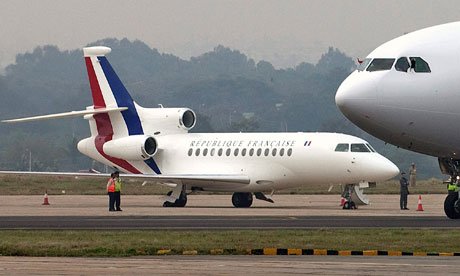
Francois Hollande's plane was apparently hit by lightning during his flight to Berlin
Analysts are watching to see how German Chancellor Angela Merkel and Francois Hollande can overcome their differences on how to resolve the crisis.
Stock markets and the euro have fallen amid continuing political uncertainty in Greece.
The chairman of the group of eurozone finance ministers, Jean-Claude Juncker, insisted on Monday that they would do “everything possible” to keep Greece in the euro.
Francois Hollande was sworn in for a five-year term at the Elysee Palace in Paris, becoming France’s first Socialist president in 17 years.
In his inauguration speech, Francois Hollande said he wished to deliver a “message of confidence”.
“My mandate is to bring France back to justice, open up a new path in Europe, contribute to world peace and preserve the planet.”
The new president said he was fully aware of challenges facing France, which he summarized as “huge debt, weak growth, reduced competitiveness, and a Europe that is struggling to emerge from a crisis”.
Francois Hollande also said he wanted other European leaders to sign a pact that “ties the necessary reduction of deficit to the indispensable stimulation of the economy”.
“I will tell them the necessity for our continent is to protect, in an unstable world, not only its values but its interests in the name of commercial exchange,” he added.
After the ceremonies, Francois Hollande named Jean-Marc Ayrault, leader of the Socialist group in parliament, as his prime minister.
Jean-Marc Ayrault, who is regarded as a Germanophile with good contacts in Berlin, had been widely tipped for the post.
Francois Hollande, 57, has spent the past week preparing to take up the presidency, and now the work begins in earnest.
Shortly after his swearing in, Francois Hollande left for Berlin to have dinner with Chancellor Angela Merkel, who said she would welcome the new leader “with open arms”.
But Angela Merkel’s embrace will hide some embarrassment after she openly supported Nicolas Sarkozy in the election battle.
“We don’t think the same on everything,” Francois Hollande acknowledged on French television on Monday.
“We’ll tell each other that so that together we can reach good compromises.”
Francois Hollande has demanded that a European fiscal pact that cracked down on overspending be renegotiated to include a greater emphasis on measures to stimulate growth, while Germany insists the treaty must be respected.
Whatever their differences, the crisis in the eurozone will put them under huge pressure to compromise, our correspondent says.
As the eurozone’s two biggest economies – and biggest contributors to its bailout funds – Germany and France are key decision-makers over the strategy supposed to pull Europe out of crisis.
According to official figures released on Tuesday morning, the French economy showed no growth in the first quarter of 2012. Growth in the final quarter of 2011 was also revised down to 0.1% from 0.2%.
However, Germany’s economy grew by a stronger than expected 0.5% in the first three months of the year.
Following his German trip, Francois Hollande will hold his first cabinet meeting on Thursday followed by a visit to Washington to meet US President Barack Obama on Friday.
[youtube ZPCQa1ndBDg]
The German economy returns to growth in the first quarter of 2012 with a better-than-expected 0.5% rise in GDP, official figures have shown.
In Q4 2011, the German economy contracted by 0.2%, its first dip since 2009.
Meanwhile, the French economy recorded zero growth in the first quarter, after growth of 0.1% at the end of 2011.
Figures released later on Tuesday are expected to show that the eurozone as a whole has returned to recession.
Data also showed that the Italian economy fell deeper into recession after contracting by 0.8% in the first quarter, slightly worse than analysts had expected. The economy shrank by 0.7% in the previous quarter.
Compared with the same a quarter a year earlier, the German economy grew by 1.7%.

The German economy returns to growth in the first quarter of 2012 with a better-than-expected 0.5 percent rise in GDP
The German statistics agency Destatis said growth was due to a rise in exports and higher domestic consumption.
The return to growth means Germany has avoided a so-called double-dip recession, confounding the predictions of a number of commentators.
In contrast, the French growth figures failed to outperform analysts’ expectations, and the growth figure for the final quarter of last year was revised down to 0.1% from 0.2%.
“There was no good surprise,” said Philippe Waechter at Natixis Asset Management.
“There was weak consumption [and] no investment.”
The French GDP figures come on the day of the inauguration of the new French President Francois Hollande, who has vowed to boost economic growth.
In the run up to the presidential election, in which he ousted Nicolas Sarkozy, he campaigned hard for measures focusing on stimulating the economy alongside the austerity measures that have been adopted across the eurozone.
He will visit German Chancellor Angela Merkel later on Tuesday to make the case for growth.
Francois Hollande believes that growth rather than austerity is the best way for governments to reduce their debts, a view that is being discussed more widely as the eurozone economy continues to struggle and increasing numbers of Europeans voice their anger at austerity.
The eurozone economy contracted by 0.3% in the final quarter of last year, and many analysts believe growth figures published later this morning will show further contraction in the first quarter of this year. If they are correct, the eurozone will be back in recession.
Francois Hollande is set to be sworn in as French president, before travelling to Berlin to discuss the future of the eurozone with Chancellor Angela Merkel.
He will be the first Socialist leader since 1995 to occupy the Elysee Palace.
Francois Hollande will later try to “find a compromise” with Angela Merkel over the German-led focus on austerity as the way out of Europe’s economic crisis.
On Monday, the value of stock markets and the euro fell amid continuing political uncertainty in Greece.
The chairman of the eurozone finance ministers, Jean-Claude Juncker, insisted on Monday night that they would do “everything possible” to keep Greece in the euro.
Jean-Claude Juncker said he looked forward to the swift formation of a new Greek government, nine days after the general election.
But he also warned that Greece had to continue the “significant efforts” already made to restructure its economy despite these policies having been rejected by a majority of voters.
Francois Hollande is expected to be sworn in shortly after meeting outgoing President Nicolas Sarkozy at the Elysee Palace in central Paris at around 10:00.
The new leader has asked that the inauguration ceremony be kept as low-key as possible, and has invited just three dozen or so personal guests to join the 350 officials attending. Neither Francois Hollande’s children nor those of his partner, Valerie Trierweiler, will be there.
The ceremony will be followed by the traditional procession in an open-topped car along the Avenue des Champs-Elysees and the laying of the wreath at the Tomb of the Unknown Soldier underneath the Arc de Triomphe.
Francois Hollande will then pay tribute to the 19th-Century educational reformer Jules Ferry and the Nobel Prize-winning chemist Marie Curie.

Francois Hollande is set to be sworn in as French president, before travelling to Berlin to discuss the future of the eurozone with Chancellor Angela Merkel
His first lunch as president will be with the former Socialist prime ministers Pierre Mauroy, Laurent Fabius, Michel Rocard, Edith Cresson and Lionel Jospin.
Francois Hollande, 57, has spent the past week preparing to take up the presidency, and now the work begins in earnest.
His first job is to name a new prime minister, who our correspondent says will most likely be Jean-Marc Ayrault, leader of the Socialist group in parliament, a German speaker and a close ally.
Michel Sapin, a key economic adviser to Francois Hollande, is tipped to be finance minister.
On Tuesday afternoon, Francois Hollande will fly to Germany for dinner with Chancellor Angela Merkel, who says she will welcome the new leader “with open arms”.
But her embrace will hide some embarrassment after Angel Merkel openly supported Nicolas Sarkozy in the election battle.
“We don’t think the same on everything,” Francois Hollande acknowledged on French television on Monday.
“We’ll tell each other that so that together we can reach good compromises.”
Francois Hollande has demanded that a European fiscal pact that cracked down on overspending be renegotiated to include a greater emphasis on measures to stimulate growth, while Germany insists the treaty must be respected.
Whatever their differences, the crisis in the eurozone will put them under huge pressure to compromise, our correspondent says.
As the eurozone’s two biggest economies – and biggest contributors to its bailout funds – Germany and France are key decision-makers over the strategy supposed to pull Europe out of crisis.
According to official figures released on Tuesday morning, the French economy showed no growth in the first quarter of 2012. Growth in the final quarter of 2011 was also revised down to 0.1% from 0.2%.
However, Germany’s economy grew by a stronger than expected 0.5% in the first three months of the year.
Following his German trip, Francois Hollande will hold his first cabinet meeting on Thursday followed by a visit to Washington to meet US President Barack Obama on Friday.
• 08:00-08:30 Francois Hollande arrives at the Elysee Palace and meets Nicolas Sarkozy
• 08:30-09:30 Inauguration ceremony followed by procession up the Champs-Elysees
• 09:45 Francois Hollande lays a wreath at the Tomb of the Unknown Soldier, under the Arc de Triomphe
• 11:45 Francois Hollande pays tribute to Jules Ferry in the Jardin des Tuileries
• 12:30 Francois Hollande honours Marie Curie at the Curie Institute
• 13:00 Ceremony at the Hotel de Ville with Paris mayor Bertrand Delanoe
[youtube 95kW51IWgCY]
[youtube EU3tM8apD0s]
For the first time ever in France, the incoming presidential couple, Francois Hollande and his partner Valerie Trierweiler, are not man and wife and the protocol boffins at the French foreign ministry are straining over an interesting conundrum: what to call the new First Lady?
Francois Hollande and journalist Valerie Trierweiler have been together since 2005; openly so since 2007, when Hollande’s relationship with fellow Socialist Segolene Royal was publicly ended.
Theirs is by all accounts a devoted partnership. Valerie Trierweiler was at Francois Hollande’s side throughout the campaign, with an office at his headquarter.
Valerie Trierweiler gives him regular advice, and is credited with having masterminded his “relooking” – the makeover and weight-loss programme that preceded his presidential candidacy.
Many will have a got a first look at Valerie Trierweiler during the victory celebrations at the Bastille on Sunday night: an attractive woman of 47 with thick chestnut hair, clearly delighted by her partner’s triumph.

Francois Hollande and journalist Valerie Trierweiler have been together since 2005
After the exotic glamour of Carla Bruni – and before her the buttoned-up correctness of Bernadette Chirac – she will offer a very different version of the presidential consort.
Valerie Trierweiler’s origins are not exactly humble, but certainly rather more ordinary than the backgrounds of her predecessors. In her own words, she comes from a family of “impoverished bourgeoisie”.
Her paternal grandfather owned a bank in the western town of Angers, but by the time Valerie Massonneau was born in 1965 the affluence had long since petered out.
Her father lost his leg at the age of 12 while playing with an unexploded shell in World War II. They lived in a council house in Angers, and her mother did part-time work as a cashier at a local skating-rink.
One of six brothers and sisters, Valerie had ambition and came to Paris to study politics. She started in journalism at the now-defunct magazine Profession Politique, and in 1989 was taken on as a political reporter at Paris Match, where she has been ever since.
Funnily enough one of her early assignments was to interview the 38-year-old Segolene Royal, who in 1992 had just given birth to her fourth child with Francois Hollande.
Segolene Royal was environment minister at the time – she was the first ever French minister to give birth in office – and spoke to Valerie Trierweiler in her hospital room.
Valerie Trierweiler briefly met Francois Hollande a few years earlier, but their friendship deepened from 2000 when they met often in the corridors of the National Assembly.
“We both loved politics, and we both loved to have a laugh,” she told one interviewer.
Today Valerie Trierweiler says she has to pinch herself to believe the extraordinary change that suddenly come upon her life.
“It’s a bit like I am the subject of one of my own despatches,” she said.
“You know that film in which a person in the audience enters the screen and becomes part of the film. It’s like that.”
Pestered by questions about how she will approach her new life, Valerie Trierweiler has said she needs time to work it out.
The couple has indicated they do not intend to live in the Elysee palace, but they have been told by the presidential security people that their current residence in the 15th arrondissement of Paris is unsuitable.
As much as possible, Valerie Trierweiler wants to maintain her previous lifestyle. She has three children by her former husband Denis Trierweiler, two of whom are taking the baccalaureate in June.
She also intends to keep on with her journalism – though she has already been obliged to give up writing on politics because of her relationship with Francois Hollande.
“It is going to be very complicated,” said the journalist and writer Philippe Labro, who gave her a job as political interviewer on the TV station Direct8.
“She is someone who has always worked, who’s come from nowhere, who’s done everything for herself. I understand her point of view, but it’s going to be very hard to keep doing that and be First Lady.”
One thing she should understand well, given her background at Paris Match, are the demands of the celebrity press – though a recent contretemps with her own employer suggests there could still be tensions to come.
When the magazine published a large and favorable photo-story about her on 8 March (International Women’s Rights Day), she tweeted: “Bravo to the sexism of Paris-Match.”
As for the protocol, no-one seriously thinks the marital status of Francois Hollande and Valerie Trierweiler presents a problem.
Times have changed – and today being unmarried is as “normal” (Francois Hollande’s watchword) as being married.
There just remains the tricky question of what to call her. Conjoint? Compagne? Maybe. Or conceivably Madame Hollande?
Francois Hollande and Valerie Trierweiler have said they will not get married purely for reasons of protocol.
 Prev1...345Page 5 of 5
Prev1...345Page 5 of 5






















